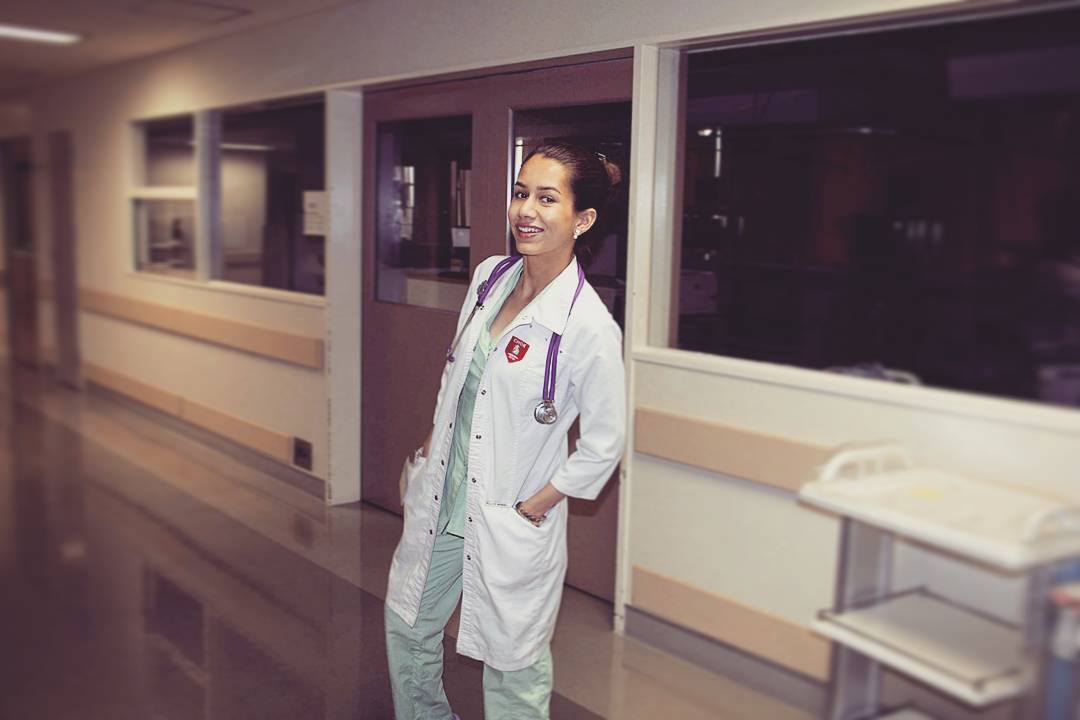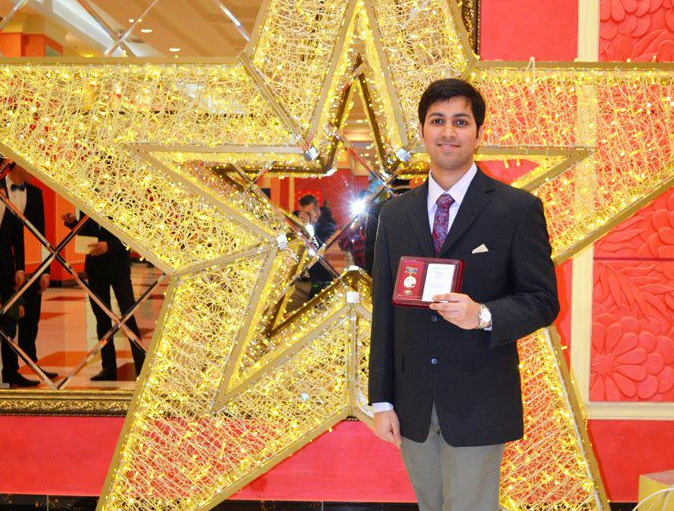
Sophia Lilothia, a student at Perm State Medical University named after Academician E. A. Wagner. Source: Personal archive
According to a study done by the Higher School of Economics, in the beginning of 2016 there were 237,000 foreign students in Russian colleges, making up five per cent of the student body. Medicine is one of the areas that enjoys a high demand among Indian students.
Russian medical schools enjoy great popularity among countries in the former Soviet Union, as well as in China, India, Vietnam, and a number of other countries. The high level of education and the affordable fees attract foreigners.
Important distinguishing characteristics of Russian medical schools are that foreign students can participate in scientific research, and that during their practice they can communicate with patients. It is true that they need to know Russian well to do this, so they pay particular attention to studying the language.
In India, being a doctor is one of the most prestigious professions. In addition, life in India is a lot less expensive than in Russia. But in order to work as a doctor in India after graduating from a Russian medical school, it is necessary for someone to substantiate his qualifications by passing a special examination. Those who can handle it then get permission to do an internship.
RIR spoke with several students and graduates and found out how they managed to learn Russian, and what awaits them when they return to their homeland.
 Uday Chandra Nishad. Source: Personal archive
Uday Chandra Nishad. Source: Personal archive
“I have been studying at the university for less than six months, but have already taken part in some student events. I live in a dormitory together with other Indian students. There are three or four people in each room. Overall, the dormitory is comfortable. It seems to have everything I need!
Despite the fact that the only people in my group are my compatriots, I found Russian friends almost immediately. They helped me a great deal to get accustomed to my new situation quickly, and to learn Russian. In our group, they teach subjects in English, but we study Russian in special classes that we have every day. We learn new words, grammar, and do our homework in the evenings. It would seem that we devote a lot of time to studying theory as it is! But when I speak with Russian friends all the rules sink in much more quickly. As a result, I already speak Russian fairly well.
And I like to write poems and stories. I write in two languages - English and Hindi, and some of my works are already dedicated to Russia. I think that there will be more in due time.
Russians are very friendly people. When I had just flown into Russia and still did not know my way around Barnaul, they helped me find my dormitory more than once.
The only thing that I have not been able to get accustomed to yet is Russian food. I adore spicy food, and in Russia the food is not that spicy. I have to add spices myself, but it is still not the same as in India.”
About the educational institution: Founded in 1954, Altai Medical University is one of the leading medical schools in western Siberia. The university conducts extensive postgraduate training and professional development for medical personnel. Foreign students are increasing in number every year here. In 2014, the university accepted 218 students, and in 2015, 350 people. Currently, around 700 people from 14 countries are studying at the university.
 Pavan Kumar Akella. Source: Personal archive
Pavan Kumar Akella. Source: Personal archive
“In Orenburg, I am studying to be a general practitioner. But I am going to go for residency as a neurosurgeon. Most of all, I am interested in what characterizes the human brain and neurology.
I have been a member of the university science club for two years now. I regularly participate in collegewide and intercollegiate scientific conventions and academic competitions. The club’s academic supervisor last year recommended that I take part in a city competition called ‘Student of the Year – 2016’; I put my research and speeches at scientific conferences together in a portfolio and submitted an application. The jury evaluated it, and I won in the Science category.
Now I am studying about brain aneurysms and pituitary gland adenomas. On April 19-21, I am going to take part in the final conference for the university science club and young scientists, where I have been a member for two years now.”
About the educational institution: Orenburg State Medical University was founded more than 70 years ago. Currently, there is a regional medical science center that is equipped with the necessary equipment and information resources. There is a foreign languages department at the university where they teach classes in English. Since 2013, Indian students have been able to study there.
“Even though I was born in Perm, I have Indian roots. My appearance, which is a bit different from the local population’s, my background, and my knowledge of three languages since I was born (Russian, English, and Hindi) were always of great interest to those around me. After all, I was the only Indian in the city before! Informing Perm residents about Indian culture involved very respectable and responsible work. But I was glad when I found out that now there would be people from my historical homeland studying in the university (in 2016, for the first time 130 students from India were enrolled in the university, and with their arrival the number of foreign students at the university almost doubled).
No matter how cliché this may sound, studying medicine is for those who really have the calling and spiritual craving. Medicine is a way of life, a style of thinking. For this reason, many students dropped out during the first couple of years, and only the most seasoned students reached the sixth year.
We have wonderful teachers, but it would be nice if the university had better equipment. The problem was especially acute during our first years. We learned a lot of things by practically counting on our fingers!
This year I am graduating from the university, and I plan on starting residency for the cardiovascular surgery speciality.”
About the educational institution: The university was opened in 1916. Currently, foreigners from more than 20 countries study at the university.
In 1992, a dean’s office for work with foreign students was created at the Perm State Medical University. Back then, 35 foreigners from Syria, Morocco, Sudan, and other countries enrolled in medical and dental school.
 Amit Soni. Source: Personal archive
Amit Soni. Source: Personal archive
“I was advised to enroll in Northern State Medical University by an acquaintance of mine who had graduated from there. I was shocked by the weather in Russia more than anything else. In New Delhi, 10 degrees above freezing is as low as the temperature gets. When I arrived in Arkhangelsk, it was -20 degrees here, and sometimes it was as low as -35. I found out for the first time what frost and cold meant, and saw snow. I was also surprised by the white nights that occur in the city during the summer. My Indian friends did not believe me at first that it can be light during the night. I had to take pictures and send them the shots.
At the university, I studied to be a general practitioner and, upon returning home, I passed a special examination to substantiate my qualifications. I admit that it was not easy to pass. Despite the fact that I got very good grades in Russia, it still took me three attempts to pass the Indian exam. But I always understood that I was studying at this university not to pass the exam and get a work permit, but to save lives later on.
Now it seems to me that we had little practice while we were studying. But the main problem that I ran into back home was that in India there are a lot of diseases that do not exist in Russia. I learned how to treat those during a year-long residency at the Sir Ganga Ram Hospital, which I just recently graduated from.
Currently, I work at the New Delhi BLK Super Specialty Hospital, which is very prestigious. Although I still have a lot of Russian friends that I keep in touch with, I miss Russia very much. I think that the country will remain in my heart forever. Next year, I plan on going to Russia to see the FIFA World Cup.”
About the educational institution: Northern State Medical University was founded in Arkhangelsk in 1932. Currently, it is the flagship medical school in the northern European part of Russia. There are now 530 foreign citizens from 16 countries studying at Northern State Medical University. To date, almost 450 people from India have graduated from the school.
If using any of Russia Beyond's content, partly or in full, always provide an active hyperlink to the original material.
Subscribe
to our newsletter!
Get the week's best stories straight to your inbox